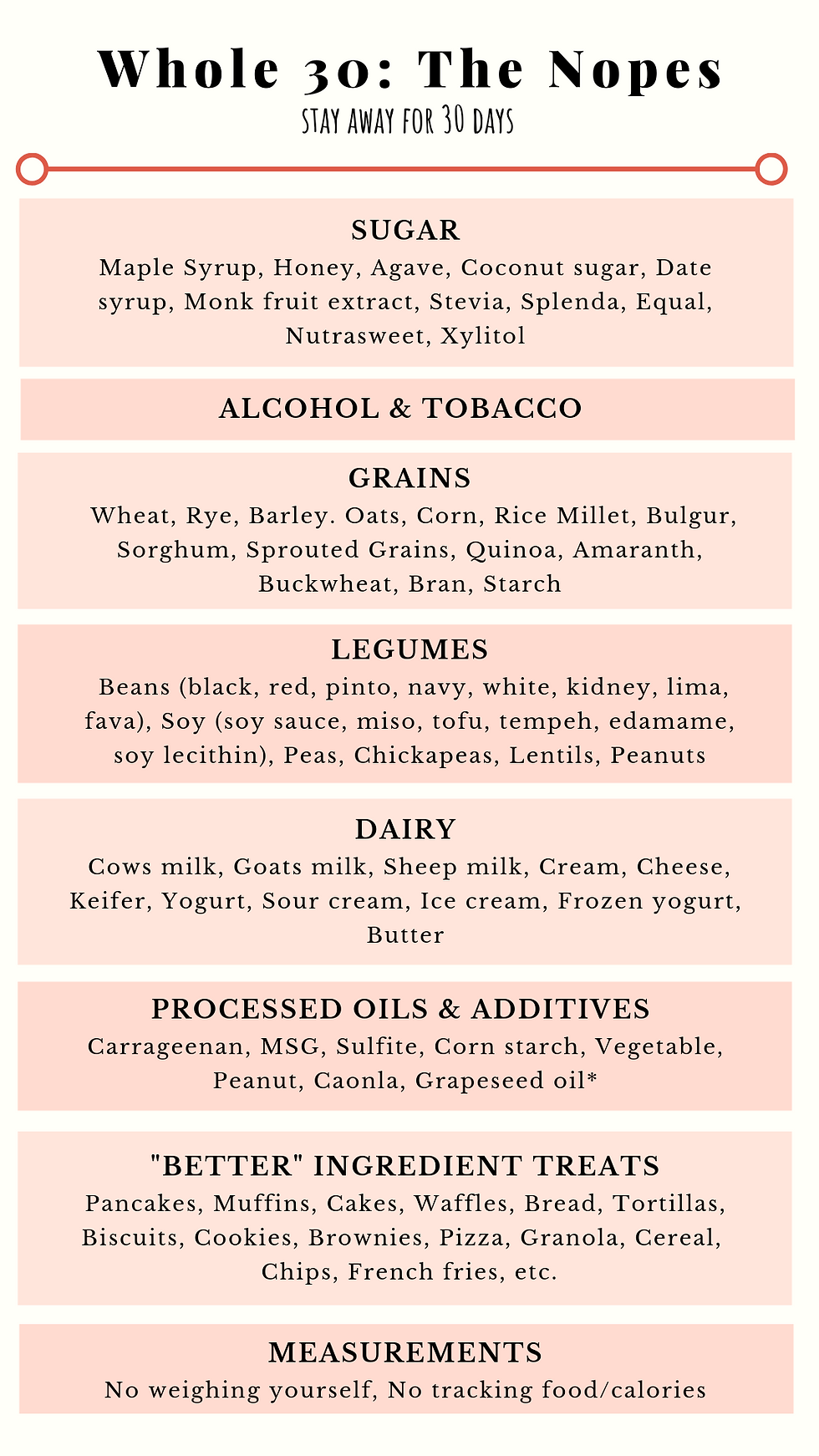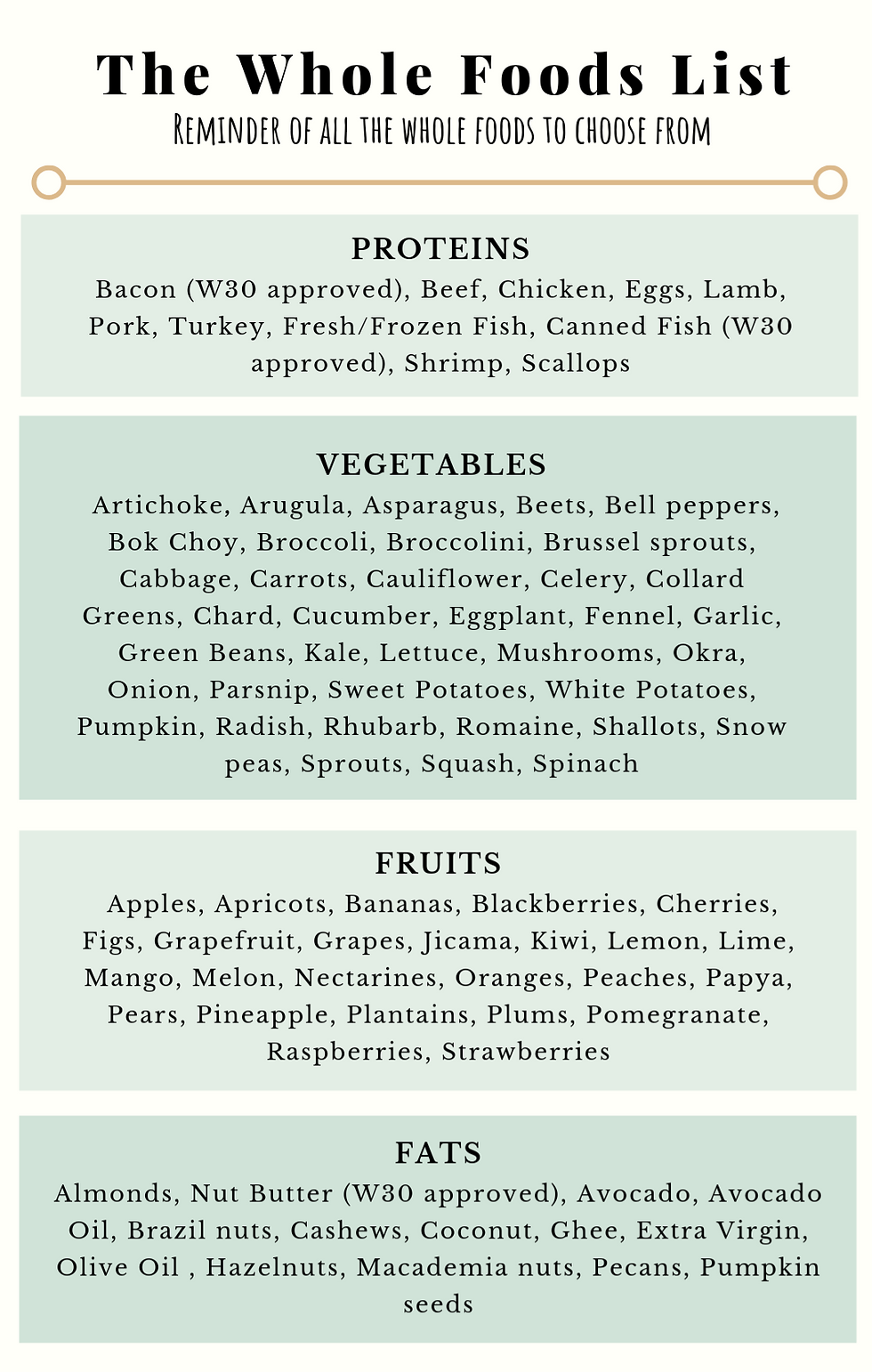
Whole30 is a 30 day program to reset your body by eliminating foods that could cause negative side effects to your physical or mental state. This is not meant to be a lifestyle, it is meant to be a strict 30 days with the intention of understanding your body. There is no gray area, no cheating, no breaks, or you restart the 30 days. Sounds harsh, but there is a reason. The strict rules are there to actually allow your body time to reset, eliminate the toxins, so you can actually notice food sensitivities that you may have. One bite or sip, will break your bodies reset, therefore, you start over. This is at its core, an elimination diet.
The goal is not weight loss. The goal is to feel better, heal your gut, build healthy habits, kick your cravings, & then after the 30 days, see what foods may be triggering to you, mentally and physically.
Beyond the specific "nope" ingredients, you also want to be eating whole meals and avoid snacking all day long. You want to have protein, fat, & carbs with each meal to help with your blood sugar and to understand how much food your body needs. If you are truly physically hungry an hour after a meal, you need to add food to your meals to keep your satiety for longer.
WHY YOU SHOULD CARE
Many foods that are considered a staple part of the "American diet" can be harmful to your gut and your brain. Whether you notice it or not, many foods could be causing brain fog, bloat, lack of energy, sleep issues, body aches, migraines, anxiety, and a poor metabolism.
Overall, there are foods that negatively effect your life and performance. The best way to see if and how they may be effecting you is by eliminating certain foods for a period of time, 30 days in this case, allowing your body to heal, then slowly adding foods back in to see how you feel. This is your own self-experiment.
I experienced my first Whole30 in January of 2018, and as cheesy as it sounds, it was life changing. Since then I have completed two full rounds, and still avoid the "nope" ingredients 90% of the time by discovering what Whole30 calls, Food Freedom.
My initial reaction to deciding to do a Whole30 was excitement, curiosity, and then some confusion. I felt a bit defeated... how on earth can every condiment, sauce, dip, non-diary milk, and protein bar, have sugar, additives, and processed oils?! Even the ones claiming health benefits and "clean" ingredients. How can I survive on just plain meat, eggs, veggies, and some fruit for 30 days?!
Doing a Whole30 will force you to read every single label and notice exactly what you are putting into your body (which, shouldn't we know what we are feeding ourselves?). It's not "easy", cause change never is, but it's not hard. As the creator of Whole30, Melissa Urban, states:
“It is not hard. Don’t you dare tell us this is hard. Quitting heroin is hard. Beating cancer is hard. Drinking your coffee black. Is. Not. Hard.”
This is the line that changed my mindset around what I could actually achieve. Yes, it's a challenge, you have to plan meals, research products, pay attention to your body, and question your habits, but the benefits far outweigh any challenge.
In the end, the results, for me, were incredible. Yes I lost weight (after feeling like I had tried everything else & got no where), but I also had more energy and all the gut issues I had slowly dissipated. It was the Whole30 that gave me more insight than any doctor or dietitian ever had because it is a study and experiment of you with a clear guide.
I highly recommend everyone try a Whole30 to open your eyes to what you are putting into your body.
HOW TO IMPLEMENT
If you are interested, I highly recommend reading the official Whole30 rules, exploring the Whole30 website, and reading through the tough love. It’s the right amount of tough love you need to be successful on this 30 day life transforming experience. Also, understanding the why behind it will help you when you want to say "forget it!"
The real first step is the initiation, deciding that you are worth it. Your health is worth a few difficult choices. Then commit to a 30 day period.
I recommend getting resources to help. I love the Whole30 Fast & Easy cookbook it has tons of recipes that take less than 30 minutes. The Whole 30 Day by Day is a journal style book to help you in the process to stay motivated, accountable, and to continue learning. You can even hire a Whole30 certified coach to help guide you and answer all of your questions!
Once you've got your resources, begin to really prep and plan. Go to through your fridge and pantry to read all of the labels. If possible, donate or throw out items that are not compliant. Things that get sneaky are dressings, condiments, spices, deli meats, packaged meats, dried fruits, non-dairy milks, & drinks.
Plan out some meals that excite you and think about what may come up in the 30 day period that you need to prepare for. Things like travel, events, group dinners, and long work days don't have to be road blocks if you prep what you will do for food and know what to say to anyone questioning your why.
Here are some useful tools to breakdown what to avoid during Whole30 and examples of what you can eat during Whole30.


I WANT MORE
Follow these folks on social media for recipes and inspiration
@whole30recipes
@whole30
@melissa_hartwig
@thedefineddish
@primal_gourmet
@daniellewalker
@jacobhealth
@healthylittlepeach
Check out all the brands that are Whole30 Compliant
Using Thrive Market you can get Whole30 compliant ingredients and snacks at a discount, delivered to your door.
My favorite brands were Primal Kitchen & Tessemae's for dressing to keep your food tasting delicious when throwing together easy meals. Nut Pods for my coffee. Coconut Aminos in replacement of soy sauce.
Comentarios